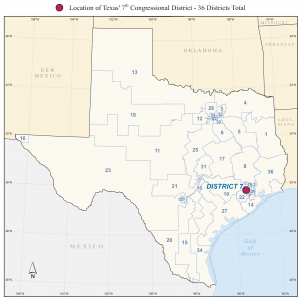November 1, 2018
Midterms and Science: TX-07
Posted by Laura Lyon
Midterms are just around the corner! There are an overwhelming number of critical races, so this week we will highlight a few that have major implications for science – mainly shake-ups in committee leadership. Read Monday’s post on CA-48 and Tuesday’s post on the Florida Senate. Don’t forget to vote on 6 November! See if you’re registered here, and find your polling location here.
Texas’ 7th
Today we’ll be looking at Texas’ 7th district and the House Appropriations Subcommittee on Commerce, Justice, and Science. Encompassing West Houston and surrounding suburbs TX-07 has been held by a Republican since 1967 when George H. W. Bush was elected into office, but that may change this year.
Who’s in the race?
Democratic lawyer Lizzie Fletcher is challenging nine-term incumbent Republican Rep. John Culberson to represent TX-07. Culberson has not had a serious competitor – especially outside the Republican party – for years, and Republican leaders were nervous about the slow start to his campaign. Fletcher is a Houston native whose campaign has been described as “inoffensive” as she tries to win the support of moderate Republicans and independents at the polls.
What’s the significance?
Since 2014 Culberson has served as chair of the House Subcommittee on Commerce, Justice, and Science (CJS), a subdivision of the influential Appropriations Committee. CJS determines funding for NASA, NOAA, and NSF, making it a vital committee for scientific research and policy.
If Culberson does not get reelected, a number of potential Republicans could succeed him in the leadership position. If Democrats take back the House current ranking member Rep. José Serrano (D-NY) would become chairman.
What does this mean for science?
Culberson has been a strong advocate for NASA, especially the Europa mission. He believes NASA should focus its efforts on space, telling the LA Times, “…NASA is spread too thin, they’re trying to do too many things. NASA needs to get back to their core mission of space exploration and scientific discovery.” Though during FY2019 appropriations, CJS unanimously approved an amendment that ordered NASA to set aside $10 million within the Earth science budget for a climate modeling system, a program very similar to the Carbon Monitoring System that Trump eliminated.
Culberson also believes the NSF should focus on basic sciences, rather than “controversial social science issues.” When questioned about anthropogenic climate change, he told the LA Times, “I’m confident humans have had some effect on the climate. We just don’t have enough data or accurate data to say with certainty what that effect has been.”
Rep. José Serrano has shown an interest in curbing the effects of climate change and protecting air and water from pollution through his voting record. He is also supportive of STEM education, applauding $5 million awarded to Bronx Community College and Lehman College from NSF, and $1 million awarded to Fordham University.
How are the candidates doing?
Like the other districts we’ve covered, this race is too close to call. Culberson won his last nine congressional races by more than 56 percent and has the advantage of being a high ranking Republican on the Appropriations Committee, which helped his district during Hurricane Harvey.
Similar to CA-48, TX-07 has changed a lot over the past two decades. In 2012, Mitt Romney won the district by 21 points, but Hillary Clinton won by 1 point in 2016. Outside of Utah, no other district flipped as dramatically between the two elections. Today the district is one of the most diverse in Houston; it is 38 percent white, 31 percent Latino, 12 percent African American, and 10 percent Asian. In addition, the district is wealthy and well educated, one of the many such suburban Republican districts that Democrats have targeted.
Fletcher has been consistently outraising Culberson since July, reporting $2.28 million compared to Culberson’s $801,000 in Q3. Much like Florida’s Senate race, Democrats are hoping “Betomania” can generate enthusiasm down the ballot in Texas, bringing more voters to the polls for Fletcher. The Cook Political Report rates this race a toss-up, and recent polls show the two candidates virtually tied.



